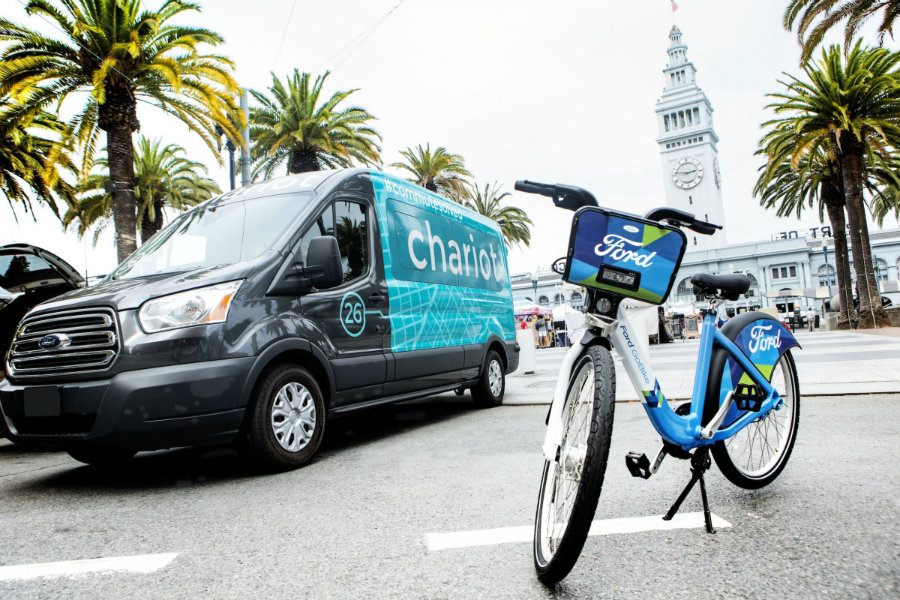Ford announced Friday it acquired Chariot, a shuttle service based in San Francisco since 2014. Ford nor Chariot disclose the purchase price, but it was an all-cash deal. New Ford CEO Mark Fields is innovating the automaker, and he includes the company into emerging transportation technology through Ford Mobility. Bike-sharing services are a plan for Ford, and it will be available by 2018.
Chariot is a private shuttle company that primarily serves San Francisco commuters, and it is the first acquisition made by Ford Mobility, which was established in March 2016. The companies did not disclose terms of the deal. Chariot is currently operating a fleet of Ford Transit Vans, a “happy coincidence” according to Ali Vahabzadeh, Chariot’s founder.

Ford has been on the market over 100 years, and it has focused on building iconic cars and trucks. But the traditions is expanding and under the leadership of CEO Mark Fields, the automaker is innovating itself into a company that is also investing in transportation technology, including share shuttle startups and shared-bicycles.
After Ford’s purchase, Chariots is staying the same: Vahabzadeh will remain CEO and assured that riders would not see any changes to their service. He said the same routes, drivers and experiences are all intact and will keep that way.
Chariot launched its idea in 2014 and had expanded its fleet of 100 shuttles that cover S.F. neighborhoods and 28 crowdsourced routes, including some going to and from the East Bay, Marin, and the Peninsula. Rides are competitive and cost anywhere from $3.80 to $5, depending on demand. Ford Transit vans have 15 seats and for riders with employer-commuter benefits, using Chariot’s services could cost even less.
Ford buying Chariot will allow the startup to expand to five new U.S. markets and scale the business to a larger global presence to follow. Ford has stated it is aiming to expand its services in the fast-evolving urban mobility market, including introducing Chariot to at least five additional markets in 18 months.
Fields told Business Insider Ford is seeing an emerging market around mobility services and said our world is moving toward both owning and sharing movement. He continued and said he did not see acquiring Chariot as a risk because the biggest risk is not to change and take advantage of opportunities.
Ford’s CEO, who is 55 years old, has been behind the automaker company and its recent initiatives outside the traditional building car focus. Fields said the growth of megacities is a significant challenge because with that comes the problem of moving people and goods around the metropolis.
“We are expanding our business to be both an auto and a mobility company, and partnering with cities on current and future transportation needs is the next major step” Mark Fields said in a statement.
Chariot based its routes on demand from riders, but Ford will use data algorithms to enable real-time mobility needs to be served. Chariot offers various monthly prices plans under Ford’s command, and users can use the pre-tax transit benefits to pay for rides.
Ford is taking over another market: Shared-bicycles
Ford’s future-of-transportation unit, Ford Smart Mobility, is also collaborating with bike-sharing service Motivate in the Bay Area to integrate its services into Ford’s FordPass app. By 2018, users will access pedal-powered transportation through the Ford GoBike. The company is expecting to have 7 thousand bikes available for sharing.
Motivate is a Brooklyn, N.Y.-based bicycle-sharing service and Fields gathered mayors of San Francisco, San Jose, and Berkeley to proposed a much larger presence by Ford in alternative transportation.
San Jose Mayor Sam Liccardo stated they want to work with communities to offer even more transportation choices and solutions for people in the next few decades. He also said the people would see bikes reproducing like bunnies all around the Bay Area.
Ford Smart Mobility is a Ford subsidiary created to work with the company’s existing research and development group to innovate in the transportation market. Its operations are run at Ford’s headquarters in Dearborn, Michigan, and Palo Alto, in the heart of Silicon Valley.
The new subsidiary is led by Jim Hackett, a former Ford’s board of directors who quit the position to take the job. The group intends to form relationships with technology companies, both large and small, to quicken the pace from conception to salable products and services, Los Angeles Times reports.
New frontiers at Ford and the compromise to keep its tradition
Chariot’s acquisition started in 2014 when Fields went to San Francisco 18 months ago to assess the startup. Vahabzadeh said they [Ford] knew that the transportation landscape was evolving, and they did not just want to be part of it, they wanted to be a leader.
Hacket stated Chariot rapidly emerged as Ford’s best bet after he went to San Francisco to visit the Bay Area from Detroit. He said Chariot impressed him. He thinks Chariot is a perfect match for Ford, and it is going to be a global play.
But apparently, Ford is not done and plans to conquer new frontiers. Fields said its company it is building new technologies and there are some cases where they have to partner with others and other times they will have to acquire. He continued and said new technologies are an ongoing process, and that is why they have set up in Silicon Valley. Fields statted Ford is going to be significantly expanding into next year.
Still, Ford is investing hard in vehicles. Last year, Ford sales of new vehicles broke a U.S. record of $17.5 million cars and trucks. Business Insider reports Pickups and SUV have led Ford’s success. The automaker has recently redesigned its most iconic vehicles -the Mustang and the F-150- and revamped its highly profitable Super Duty.
Source: Business Insider
